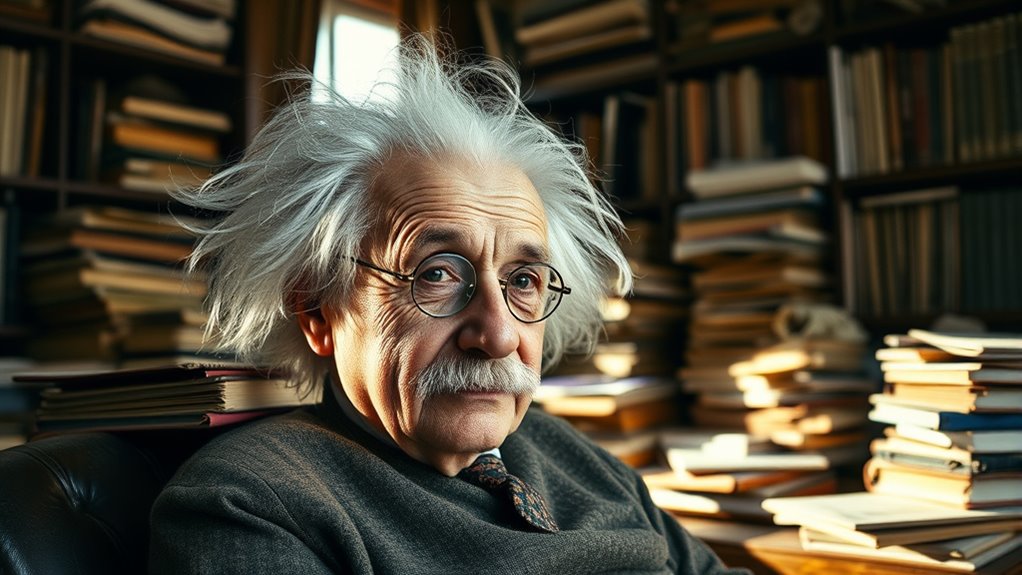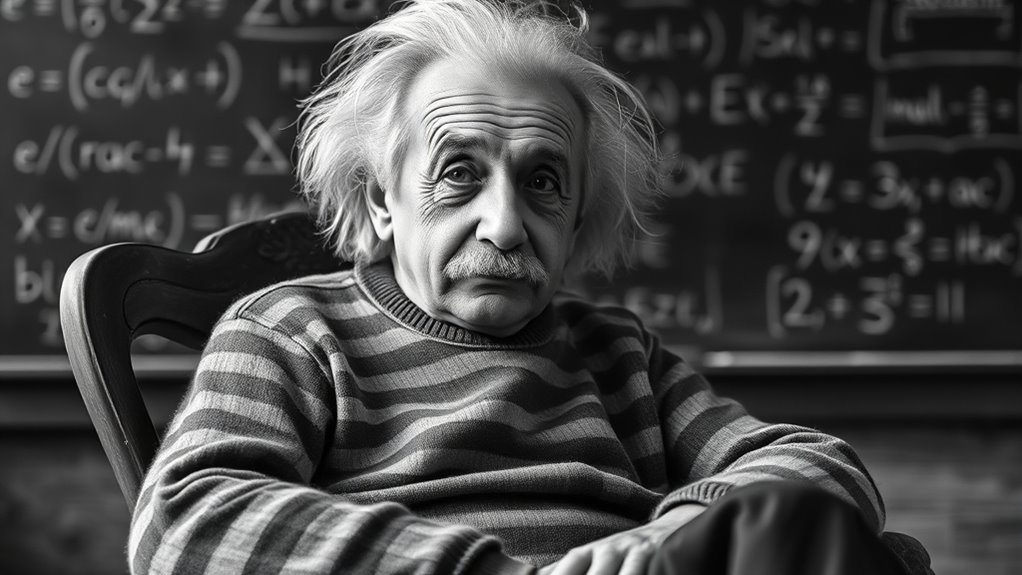Albert Einstein believed that true education isn’t just about memorizing facts or passing exams; it’s about developing a curious mind that continues to explore long after lessons end. It’s about fostering critical thinking, questioning, and a passion for discovery. When you focus on understanding and inquiry, the knowledge stays with you in a meaningful way. If you’re curious about how this perspective can shape your learning journey, keep exploring the ideas that follow.
Key Takeaways
- True education emphasizes understanding and critical thinking beyond memorized facts.
- It fosters curiosity, lifelong learning, and the ability to adapt and innovate.
- Learning is viewed as an ongoing journey of exploration, not just information absorption.
- The essence of education remains even after specific details are forgotten, such as problem-solving skills.
- Einstein believed education should cultivate a mindset of discovery and personal growth, not just rote memorization.

Many people recognize Albert Einstein not only for his groundbreaking contributions to physics but also for his insightful views on education. Einstein believed that true learning goes beyond memorizing facts or passing exams; it’s about fostering a mindset that encourages innovative learning and nurtures lifelong curiosity. When you think about education this way, it shifts from a mere process of information delivery to an ongoing journey of discovery and personal growth. You’re not just acquiring knowledge—you’re developing the ability to think critically, question assumptions, and explore new ideas.
Einstein emphasized that education should inspire students to remain curious throughout their lives. The goal isn’t just to fill your mind with facts but to cultivate a sense of wonder that drives you to keep learning long after school days are over. You might find that when you approach learning with this mindset, it becomes more engaging and meaningful. Instead of seeing education as a chore, you see it as an opportunity to explore the world around you and develop innovative solutions to problems. Einstein believed that this kind of curiosity fuels creativity and innovation, essential qualities in a constantly changing world.
He also pointed out that education should be flexible and tailored to individual needs, emphasizing understanding over rote memorization. When you focus on understanding concepts deeply, you’re more likely to retain information and apply it in real-world situations. This approach encourages you to ask questions, experiment, and learn from mistakes—key components of innovative learning. Einstein’s perspective was that education isn’t just about imparting knowledge but about equipping you with the skills to adapt and grow throughout your life. It’s about developing a mindset that values continuous learning, where curiosity is the engine that drives progress. Lifelong curiosity is a core element that helps sustain growth and innovation in every stage of life.
Frequently Asked Questions
Did Einstein Struggle With Traditional Schooling Methods?
You might find that Einstein struggled with traditional schooling because he faced learning difficulties and didn’t always connect well with teachers. His innovative thinking often clashed with rigid classroom methods, making it hard for him to thrive in standard environments. Despite these challenges, he pursued his curiosity independently, showing that a tough relationship with teachers doesn’t define your potential. Instead, it can push you to find your unique path to success.
How Did Einstein’s Education Influence His Scientific Discoveries?
Your unique learning styles shaped Einstein’s scientific strides, demonstrating how personalized approaches foster innovation. His unconventional education challenged traditional pedagogical impacts, encouraging curiosity over conformity. By favoring exploration over rote memorization, Einstein unbarred groundbreaking ideas like relativity. This influence shows that embracing diverse learning styles can inspire scientific discovery, proving that education’s true power lies in nurturing curiosity and critical thinking beyond standard schooling methods.
What Alternative Learning Methods Did Einstein Prefer?
You should know that Einstein preferred alternative learning methods like innovative teaching and creative learning. He believed in exploring concepts through curiosity, imagination, and hands-on experiences rather than just memorizing facts. By embracing these methods, he fostered a deeper understanding of physics. This approach allowed him to think independently, challenge existing ideas, and ultimately develop revolutionary theories that changed our understanding of the universe.
Was Einstein a Self-Taught Scientist?
Yes, Einstein was largely a self-taught scientist. You see, he valued informal learning through curiosity, exploration, and independent thinking more than formal education. While he attended school, he often preferred studying on his own, questioning established ideas, and diving into complex topics outside the classroom. This approach allowed him to develop a deep understanding and innovative insights, demonstrating that self-directed, informal learning can be just as impactful as formal education.
How Did Einstein’s Educational Experiences Shape His Worldview?
You realize Einstein’s educational journey profoundly influenced his worldview, shaping his philosophy of education and learning philosophy. His curiosity-driven approach, questioning authority and embracing independent thought, underscores the importance of fostering critical thinking. By exploring diverse subjects and challenging traditional methods, he believed education should inspire discovery. This mindset helped him develop innovative ideas, demonstrating that a flexible, inquisitive learning philosophy can lead to groundbreaking insights and a lifelong passion for knowledge.
Conclusion
So, next time you forget the details of a lesson, remember that true education sticks with you beyond facts. You realize that what truly remains is your ability to think, question, and understand. Isn’t it more valuable to learn how to learn rather than just memorize? Embrace the idea that education isn’t about perfection, but about growth. After all, isn’t the real knowledge what lingers long after the details fade away?









